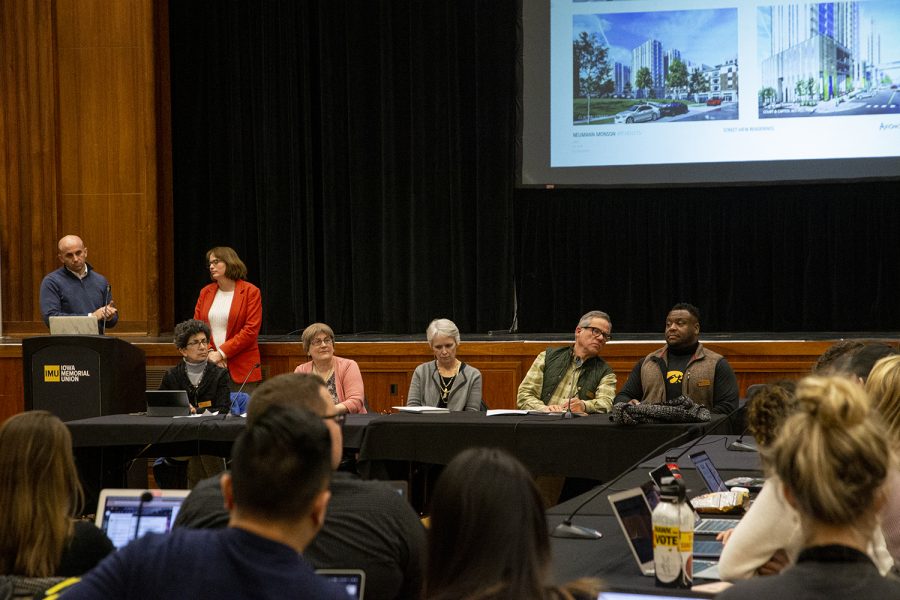Iowa City City Council seeks input from UI student governments before vote on luxury-apartment development
At the inaugural joint session between both student governments and the Iowa City City Council, students raised concerns about housing affordability and the rise of luxury-apartment developments in the area.
Members of the Iowa City City Council sit before the two UI student governments for a discussion about a proposed development project in downtown Iowa City during a joint meeting on Feb 11.
February 12, 2020
At the inaugural joint session between University of Iowa Student Government, Graduate and Professional Student Government, and Iowa City City Council, all three groups were focused on housing developments and affordability in Iowa City.
The housing affordability conversation revolved around a newly proposed development at 12 E. Court St. that would contain a 900-unit building with student housing, academic study areas, and other recreation amenities.
Construction for the unit would not start for up to another year and a half, Iowa City City Manager Geoff Fruin said.
“The developers are seeking a grant for a height bonus from eight stories to 15 stories,” Fruin said. “This will be voted on at next Tuesday’s city council meeting.”
RELATED: Faculty Council discusses affordable student housing with City Council
Fruin added that new and more expensive apartments could potentially concentrate more attention on older and more affordable apartments — producing a ripple effect in regards to a lack of affordable housing.
UISG Senate Parliamentarian Jacob Heid touched on how many projects are already underway near his home on South Dubuque Street.
“I was wondering if these high-density, luxury style apartments are the future of Iowa City that’s being envisioned long-term — what will Iowa City turn into?” Heid said.
Fruin referenced a long-term housing study completed by the city around four years ago that he said showed Iowa City lacks a lot of student-focused, larger residences.
“There is a national trend with developments like the Quarters, Rise and Latitude that are being branded nationally,” he said.
Iowa City is lagging on this trend and there are many out-of-state companies looking heavily at the student housing market in the area, he added.
Many students from GPSG and UISG voiced their concerns about the 900-unit development, arguing that these apartments are a luxury and not affordable for students who make up a significant amount of the local renters’ community.
UISG Black Constituency Sen. Adeline Barron was one of these students. Many low-income students are not being accommodated, she said, especially when rent is high in apartments that are close to campus.
RELATED: Iowa City City Council amends Riverfront Crossings affordable-housing requirements
“Low-income [students] are going to be pushed to the outskirts,” Barron said. “People who live in Iowa City are going to be people who can afford rent of $700 and up. This means a 30- to 45-minute commute to class … and back home. Places like this [development] are not affordable.”
UISG members were also concerned about landlords ignoring students’ complaints about rent inflation or maintenance.
Fruin and Tracy Hightshoe, neighborhood development and services director for Iowa City, suggested students file complaints and use the city’s website to ensure that landlords are following laws.
However, GPSG Diversity, Equity, and Inclusion Chair Moala Bannavti said that wasn’t enough for her constituents.
“For a lot of the people that I represent, websites aren’t necessarily the best way or the easiest way to communicate,” she said. “Not everyone has the same computer literacy. I think that it’s important for the city to look at other ways to communicate with students.”




